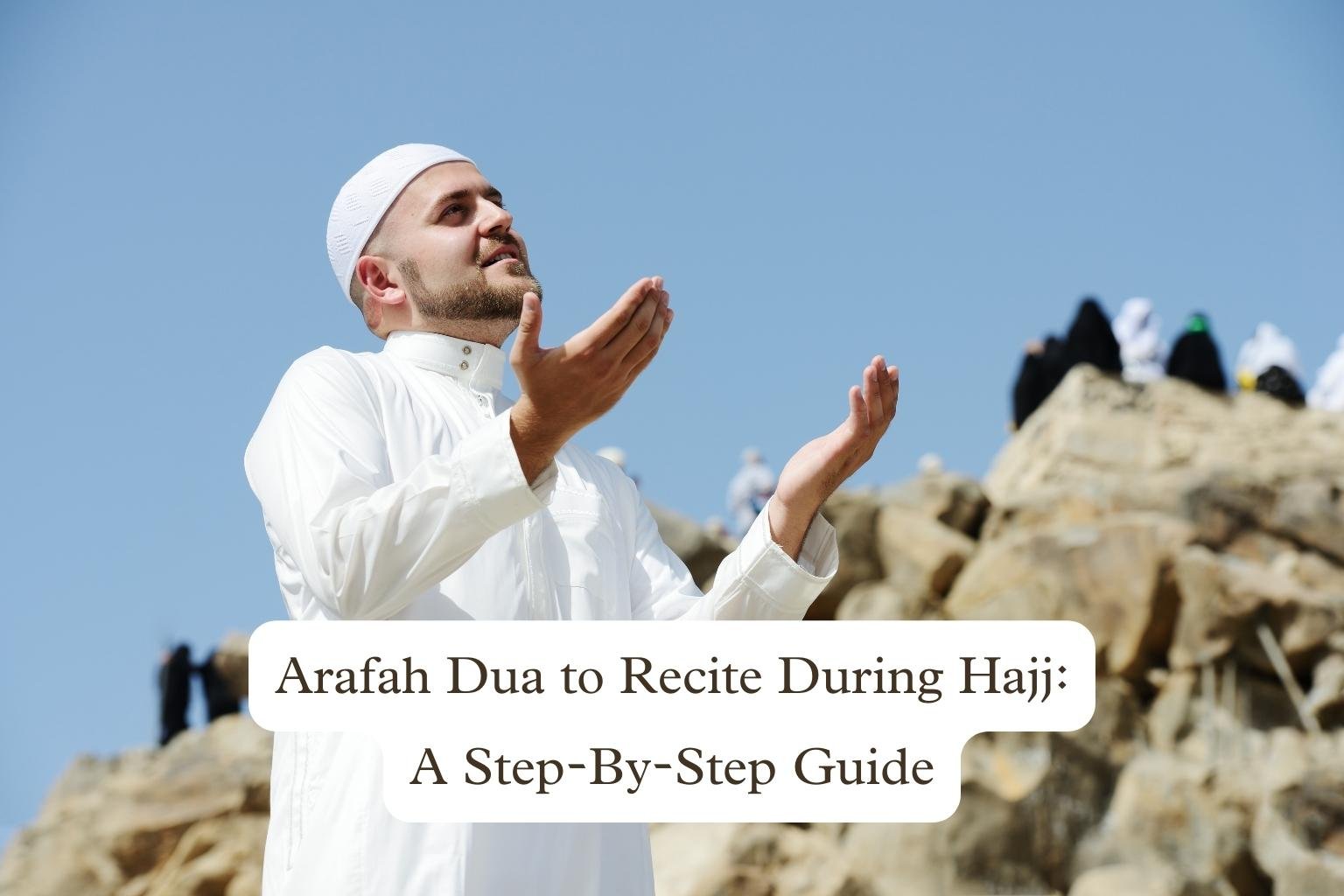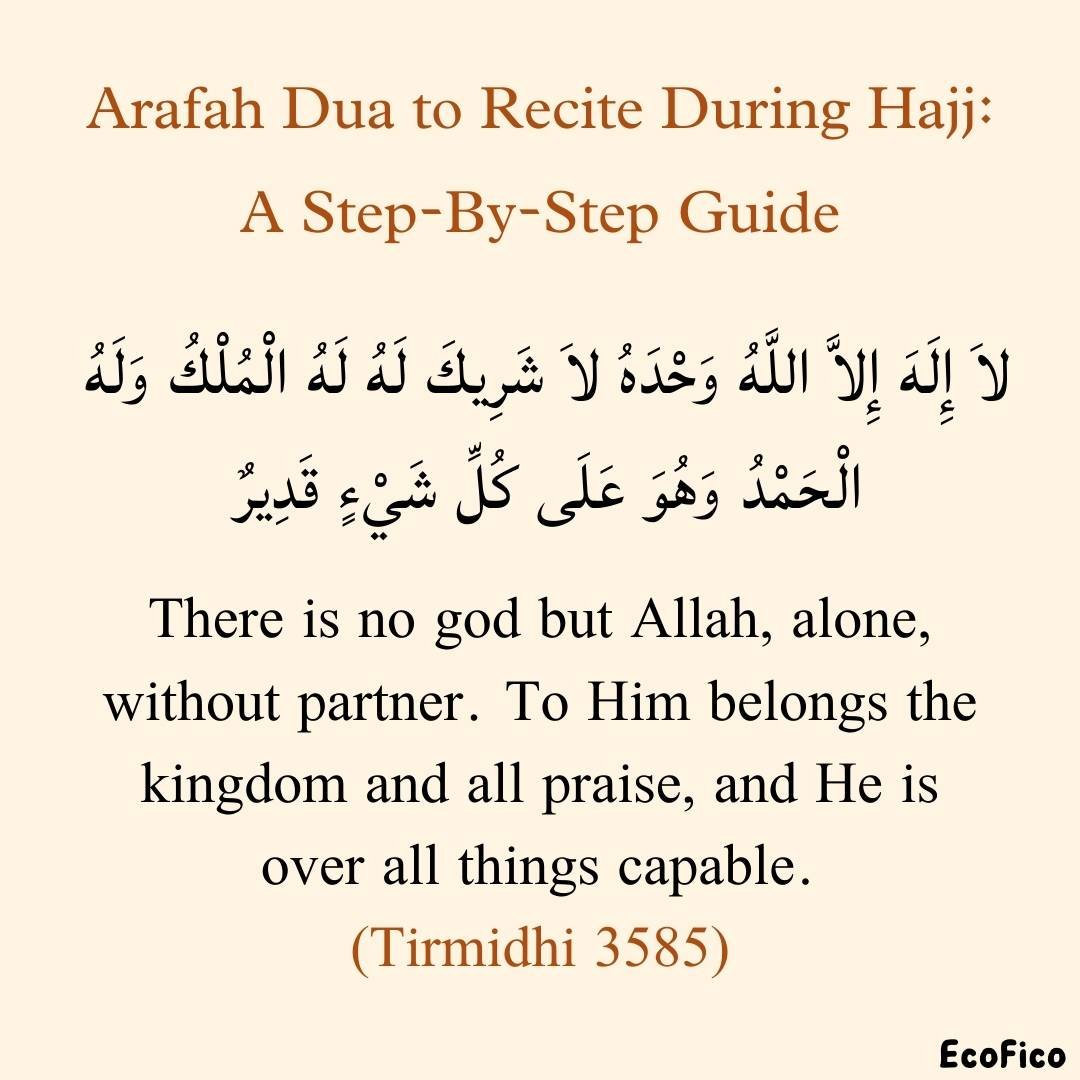 The Day of Arafah is often described as the very heart of Hajj, a moment when time seems to pause and every soul turns fully toward Allah ﷻ. Among the countless prayers made on this sacred day, there is one special Arafah Dua to Recite During Hajj that carries unmatched weight and blessing. As pilgrims stand together on the vast plain of Arafah—hands raised, hearts pouring out, and tears flowing—the atmosphere becomes filled with a sense of unity and deep humility before the Creator. It is in this profound setting that the greatest supplication ever taught takes center stage, linking the worshippers of today with the legacy of the Prophets of the past.
The Day of Arafah is often described as the very heart of Hajj, a moment when time seems to pause and every soul turns fully toward Allah ﷻ. Among the countless prayers made on this sacred day, there is one special Arafah Dua to Recite During Hajj that carries unmatched weight and blessing. As pilgrims stand together on the vast plain of Arafah—hands raised, hearts pouring out, and tears flowing—the atmosphere becomes filled with a sense of unity and deep humility before the Creator. It is in this profound setting that the greatest supplication ever taught takes center stage, linking the worshippers of today with the legacy of the Prophets of the past.
The Prophet ﷺ emphasized this by saying:
“The best supplication is the supplication on the Day of Arafah. The best of what I and the Prophets before me have said is: ‘Laa ilaaha illallaahu wahdahu laa shareeka lah, lahul-mulku wa lahul-hamdu wa huwa ‘ala kulli shay’in qadeer.’” (Tirmidhi 3585)
Though, these words may seem simple at first glance, yet their meaning is profound. Through this declaration of pure monotheism, you are affirming Allah’s Oneness, praising Him for His dominion, and acknowledging His absolute power over all things. By reciting it on the Day of Arafah, you are not only engaging in the best form of dhikr but also connecting yourself to a chain of devotion that stretches back through every Prophet before you.
Recommended: Spiritual Landmarks in Saudi Arabia for Muslims
Arafah Dua to Recite During Hajj in Arabic
لَا إِلٰهَ إِلَّا اللهُ وَحْدَهُ لَا شَرِيْكَ لَهُ، لَهُ الْمُلْكُ وَلَهُ الْحَمْدُ وَهُوَ عَلَى كُلِّ شَيْءٍ قَدِيرٌ
Transliteration of Arafah Dua
Laa ilaaha illallaahu wahdahu laa shareeka lah, lahul-mulku wa lahul-hamdu wa huwa ‘ala kulli shay’in qadeer.
English Translation Dua During Arafah
There is no god but Allah, alone, without partner. To Him belongs the kingdom and all praise, and He is over all things capable.
Recommended: Istikhara Dua in English: Best English Dua for Salat al-Istikhara
Why It Hits Us So Hard: Arafah Dua to Recite During Hajj
However, it’s not just a formula. These words strip away everything we cling to — careers, status, wealth — and remind us who really owns everything.
So, if you’re from the US, UK, Canada, or Australia, life is busy and full of noise. This dua forces you to pause and admit: I don’t control a thing. Allah does.
How to Recite It in a Way That Sticks
- Repeat it slowly. Don’t rush. Let the words sink in.
- Break it into parts. Say one phrase, pause, breathe, and let it land.
- Make it personal. After finishing, speak to Allah in your own language. Tell Him what hurts, what you’re scared of, what you’re hoping for.
- Use it as an anchor. When your mind wanders, return to these words.
Example: Whisper “Laa ilaaha illallah…” and pause. Think of the times you turned to other things for comfort. Then return: “Wahdahu laa shareeka lah…” — He’s enough.

Recommended: How to Make Intention for Umrah: Dua and Step-by-Step Guide
If You’re Not on Hajj
- Here’s the beauty: even if you’re not standing on the plain of Arafah, you can still connect to this day.
- Fast on the Day of Arafah. The Prophet ﷺ said fasting that day wipes out the sins of the previous year and the year to come (Muslim 1162).
- Carve out quiet time. Turn off notifications, sit with this dua, and make it your centerpiece.
- Stream a sermon or reminder. Many mosques in the US and UK share live Khutbah translations — tune in and follow along.
Real Voices from the Ummah
One Muslim on Reddit said it simply:
“The best supplication ever said by myself and the previous Prophets…”
That’s the power of this moment. Millions of people, scattered across the world, saying the same words with the same hope.
Recommended: How to Drink Zamzam Water During Hajj and Umrah Full Guide
Closing: A Personal Note
Above all, I haven’t been to Arafah myself yet. However, every time I read this dua, I can almost picture the scene — dust on my face, heart racing, and hands lifted high in prayer. In that moment, the power of this supplication becomes clear: it doesn’t just belong to those who are physically present; rather, it connects every believer, no matter where they are. Through these words, you are spiritually standing on the plain of Arafah, tied to the same moment that countless others have experienced before you.
Therefore, when the Day of Arafah comes, there’s no need to overthink or complicate it. Instead, simply say the words with sincerity, feel their weight in your heart, and allow them to open the door to everything else you hope to ask from Allah.
Common Questions About Arafah Dua to Recite During Hajj
1. Can I recite this dua at home if I’m not at Hajj?
Yes. It’s recommended for everyone, whether you’re in Arafah or across the ocean.
2. Are there other duas for Arafah?
Yes. You can make any personal dua, Qur’anic duas, or dhikr. But this specific one carries the strongest legacy.
3. Do I need to fast if I’m not in Hajj?
If you’re able, yes. It’s one of the most rewarding fasts outside Ramadan.
4. When should I say the dua?
Anytime during the day of Arafah, especially in the afternoon before Maghrib.
5. Can I make my own personal duas on Arafah in English?
Yes. While the Prophet ﷺ taught specific duas, it’s completely fine to pour your heart out in your own language. Allah understands every tongue.
6. Do I have to raise my hands when making dua on Arafah?
It’s Sunnah to raise your hands in humility and supplication, but the key is sincerity, not the posture.
7. Is the Arafah dua only for people performing Hajj?
No. Muslims around the world are encouraged to make dua on this blessed day. Even if you’re not in Hajj, your duas hold immense value.
8. What time is best to recite the Arafah dua?
Anytime after Dhuhr until Maghrib on the 9th of Dhul-Hijjah. Scholars recommend spending as much of the afternoon in dua as possible.
9. Can women recite the same Arafah dua as men?
Absolutely. There’s no difference — the duas are the same for everyone. What matters is sincerity, focus, and turning to Allah.
10. Do I need to read the Arafah dua in Arabic?
It’s best if you can, but if you struggle, reading the transliteration or translation is fine. What matters most is the heart behind the words.
Explore all Posts on EcoFico
Hajj Guide Step by Step: A Complete Walkthrough for Pilgrims
Umrah Guide Step by Step: Everything You Need to Know in 2025
Difference Between Hajj and Umrah: A Step-by-Step Deep Dive
Arafah Dua to Recite During Hajj: A Step-By-Step Guide
Hajj History and Its Significance in Islam: A Detailed Guide
The Significance of Umrah in Islam – A Blessing for Muslim
How to Drink Zamzam Water During Hajj and Umrah Full Guide
How to Make Intention for Umrah: Dua and Step-by-Step Guide
Umrah Meaning in Islam: What Does Umrah Really Mean?
Istikhara Dua in English: Best English Dua for Salat al-Istikhara
I Am Going to Umrah Please Forgive Me Message:Umrah Message
Umrah Mubarak Wishes in English & Arabic: Learn Best Wishes
What Does Umrah Mubarak Mean in Islam? Know its Real Meaning
Dua for Drinking Zamzam Water: Arabic, English, and Benefits
Niyat of Umrah: Umrah Niyat Dua in Arabic and English
Benefits of Umrah: Spiritual, Emotional, and Worldly Rewards